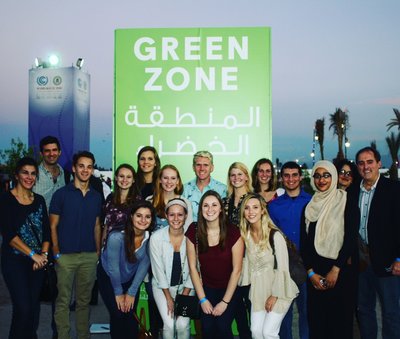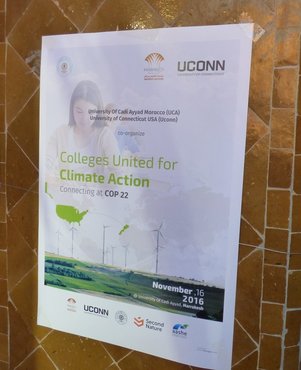This guest post is by Oksan Bayulgen, Associate Professor of Political Science, Faculty Director of UConn’s Global House, and Rich Miller, Director, UConn Office of Environmental Policy & Sustainability about COP22.
Only a few days after the historical elections in the United States, we set out to North Africa to attend the U.N.’s international conference on climate change. COP22 was supposed to be a relatively straightforward, low-key conference a year after the monumental Paris Agreement had emerged from COP21. The goal was to take stock of the progress each country has made so far and flesh out the remaining challenges in the implementation of the national pledges.
Instead, this goal was overshadowed by the unexpected turn of events in the U.S., with the improbable election of Donald J. Trump to the presidency. Given his climate change denialism and explicit rejection of the Paris Agreement (in addition to many other statements in favor of the fossil fuel industry), there were genuine concerns that the hard fought achievements of the previous year would be reversed with a possible withdrawal of the U.S. from the historical agreement. When we landed in Marrakesh, Morocco, we found ourselves right in the middle of that pervasive sense of doom and gloom.
To be honest, on our first day in Marrakesh, we were very pessimistic as well. Based on our combined years of experience, whether it’s conducting research and teaching various classes on the politics of energy, or working to develop environmental and sustainability programs at UConn or in the corporate world, we have come to appreciate the critical importance of leadership and an institutional balance of power in designing and implementing environmentally friendly policies. Even in a democracy like that of the U.S., where there are strong checks and balances, a president singlehandedly has a lot of power to affect and change the course of policy in the years to come. It would be naïve and uninformed to assume that the path of progress that was set by an outgoing president could not be reversed by a new president.
Yet, as the week went by, seeing and interacting with some of the passionate and committed “foot soldiers” of this environmental movement, we started to relax and see the glass half full. There are three main reasons why we are more hopeful now.
First of all, even though anti-globalization forces have gained ground and popularity in the U.S. and elsewhere in the world in recent years, it is clear to us that COPs in many ways represent the best of globalization. They prove that there are no national boundaries, no walls, and no cultural differences when it comes to the aspiration to find solutions to a truly global challenge such as climate change. These conferences are the best and most hopeful responses to the isolationist and xenophobic calls that we have come to see in many countries around the world. They reinforce the belief that we are not alone in this world in our fight against dark forces that want to reverse progress.
[COPs] prove that there are no national boundaries, no walls, and no cultural differences when it comes to the aspiration to find solutions to a truly global challenge such as climate change.
Secondly, the fact that COP22 took place in Morocco, a developing country with many economic challenges of its own, in and of itself, sends a hopeful message. One of the themes of this meeting was the synergy between sustainable development goals and climate action. The clear message was that policies to fight climate change could be successful only if they also provide economic and social benefits to communities and respect the rights of vulnerable, marginalized groups. Or put differently, countries do not need to choose between economic development and the environment. It is not a zero sum game. Concerns about economic insecurity need not trump anxieties about environmental insecurity. Sustainability requires us to think of these two as complementary and as reinforcing each other. To us, the location of this COP and the excitement and commitment of so many delegations from developing countries, especially in Africa, proved unequivocally that the momentum of Paris cannot be reversed. With or without the U.S., the Paris accord will live on.
 Finally, in the course of a week, we witnessed among our students (as well as millions more in the U.S. and around the world) the transformation of the post-election blues into a fresh determination and commitment to keep fighting. We think (and hope) that this setback will motivate and empower younger generations to participate in the decision-making processes at local and national levels, in the plethora of ways that our democracy offers. And, as demonstrated by dozens of students, from Morocco’s Cadi Ayyad University, UConn and several other American universities, who spoke at the higher education networking event, Colleges United For Climate Action, there are more that unite than divide the younger generations around the world. Climate change is the defining and unifying challenge of our times and the millennials are all in!
Finally, in the course of a week, we witnessed among our students (as well as millions more in the U.S. and around the world) the transformation of the post-election blues into a fresh determination and commitment to keep fighting. We think (and hope) that this setback will motivate and empower younger generations to participate in the decision-making processes at local and national levels, in the plethora of ways that our democracy offers. And, as demonstrated by dozens of students, from Morocco’s Cadi Ayyad University, UConn and several other American universities, who spoke at the higher education networking event, Colleges United For Climate Action, there are more that unite than divide the younger generations around the world. Climate change is the defining and unifying challenge of our times and the millennials are all in!
Overall, this was an amazing trip! Beautiful Marrakesh was the backdrop to the great new friendships we formed and the new networks we established. This trip also proved, once again, the importance of experiential learning. Outside the traditional classroom setting, we were able to see, breathe, feel climate change and learn about the innovations, and policy solutions that real bureaucrats, corporations, and civil society organizations bring to the table. Last year in Paris and again this year in Marrakesh, history was made and we were there to witness it!
 UConn needs to continue this participation in future COPs, and other colleges and universities should engage as well. Now more than ever, higher education needs to lead by example on the myriad science, policy and human rights issues surrounding climate change. We are all better for having attended this conference.
UConn needs to continue this participation in future COPs, and other colleges and universities should engage as well. Now more than ever, higher education needs to lead by example on the myriad science, policy and human rights issues surrounding climate change. We are all better for having attended this conference.
And now… we need to keep calm and keep fighting the good fight!
The UConn@COP22 team of 12 students, four faculty members and two sustainability staff, arrived at the Green Zone in Marrakech, Morocco last week.
UConn and Marrakech’s Universite Cadi Ayyad (enrollment 85,000), co-hosted a higher education networking event, co-sponsored by AASHE and Second Nature. Colleges United for Climate Action attracted 50 students, faculty and staff, mostly from the U.S. and Morocco.